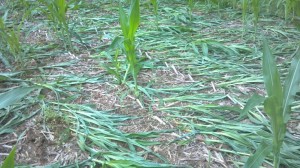Continued saturated soils in some parts of the state have created concern with producers that N fertilizers that were already applied may be partially lost. Nitrogen loss through denitrification occurs when nitrogen in the nitrate (NO3) form is converted to nitrogen gas by bacteria in the soil. The amount of denitrification increases Continue reading
Category Archives: Corn
Pre Tassel Nitrogen in Corn
Our corn planting window was pretty strung out this year, ranging from end of March until close to the end of May. Just wanted to include a few comments on nitrogen for those still needing to put out adequate amounts and those thinking about pre-tassel applications. Continue reading
Crop Progress
As reported by NASS on June 9, 2014
HEAVY RAINFALL HINDERS SOME FIELD ACTIVITIES
Heavy rainfall brought needed moisture, but continued to cause delays in cotton and soybean planting. While a few areas were reporting dry conditions, overall crop condition was mostly good to excellent. Continue reading at Crop Progress 6 8 14
Leaning and Greensnapped Corn and Flooding

Have been checking fields this week for stalk issues in corn, especially after the high winds that occurred here lately. Fortunately many fields look fine and corn is standing well. In other areas at least some corn did sustain wind damage causing leaning or snapped stems. Continue reading
Crop Progress
As reported by NASS of June 2, 2014
Scattered Showers Hinder Planting
Scattered showers brought needed moisture, but caused delays in cotton and soybean planting. While some areas were reporting dry conditions, overall crop condition was mostly good to excellent. The daily threat of rain kept hay producers from the fields in most areas. A few wheat producers reported problems with head scab. Continue reading at Crop Progress 6 1 14
Late Planting ends Soon for Corn
Corn planting has wrapped up for most folks across the state. Late planted corn did well in an unusually wet year such as 2013, but is very risky in most years unless irrigation can be provided. Continue reading
Crop Progress
As reported by NASS on May 27, 2014
CORN PLANTING WRAPPING UP; COTTON AND SOYBEAN PLANTING ACTIVE
Dry, windy weather last week enabled producers to nearly finish planting corn and make substantial progress on cotton and soybean planting. While some cool nights hampered crop development, overall crop condition flourished. Continue reading at Crop Progress 5 25 14
Crop Progress
As reported by NASS on May 19, 2014
PLANTING OF COTTON AND SOYBEANS IN FULL SWING
Heavy rainfall at mid-week hampered field work. Corn producers were winding down their planting, while cotton and soybean planting continued early in the week. Wheat and pastures continue to flourish from adequate moisture. Pastures are in mostly fair to good condition. Topsoil moisture levels were rated 6 percent short, 72 percent adequate and 22 percent surplus. Subsoil moisture levels were rated 6 percent short, 79 percent adequate, and 15 percent surplus. There were 3.5 days suitable for field work last week. For more details click on Crop Progress 5 18 14.

